|
|
|
Sort Order |
|
|
|
Items / Page
|
|
|
|
|
|
|
| Srl | Item |
| 1 |
ID:
169164
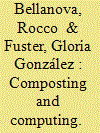

|
|
|
|
|
| Summary/Abstract |
Making sense of digital security practice requires grasping how data are put to use to compose the governing of individuals. Data need to be understood in their becoming, and in their becoming something across diverse practices. To do this, we suggest embracing two conceptual tropes that jointly articulate the being together of, and in, data compositions: composting and computing. With composting, we approach data as lively entities, and we explore the decaying and recycling processes inside Big Data security. With computing, we approach data as embodied and embodying elements, and we unpack the surveillance of ‘asylum speakers’. Together, composting and computing challenge recurrent images of data. Our conceptual composition takes sound as a necessary sensory counterpoint to popular data visions, notably in light of Ryoji Ikeda's artworks.
|
|
|
|
|
|
|
|
|
|
|
|
|
|
|
|
| 2 |
ID:
184316
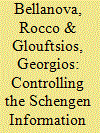

|
|
|
|
|
| Summary/Abstract |
This article focuses on the Schengen Information System (SIS II) – the largest data infrastructure supporting police cooperation and border controls in the European Union. Through the SIS II, national authorities exchange information about individuals and objects, and this across national and institutional boundaries. Yet, the SIS II does not always perform as anticipated in its design scripts. Following common threads about infrastructural politics across Science and Technology Studies, political geography and critical security studies, we explore fragility and maintenance as being intrinsic to the functioning of data infrastructures and crucial sites of governance. We show how the SIS II is kept under continuous control to operate as a controlling data infrastructure. This article contributes to a critical inquiry into the datafication of border controls by interrogating how data acquire the status of allegedly credible and accurate information. Ultimately, this approach pinpoints the inherent fragility of seemingly mighty data infrastructures and casts a light on those actors and processes that sustain, through maintenance, contemporary digital borders.
|
|
|
|
|
|
|
|
|
|
|
|
|
|
|
|
| 3 |
ID:
130992
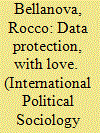

|
|
|
|
|
| Publication |
2014.
|
| Summary/Abstract |
How to Engage with the Politics of Privacy in the Age of Preemptive Security? My suggestion is to start with data protection, which, following De Hert and Gutwirth (2006), is not exactly the same of privacy. Extrapolating from their analysis of the two as different "legal tools," I would say that privacy and data protection are two slightly different rationales of power relations: one of privacy based on the "opacity of the individual" and one of data protection on the "transparency and accountability of the powerful" (Gutwirth and De Hert 2008:275; emphasis in original).1 These rationales (attempt to) orientate two different loose dispositifs, each formed by a composite ensemble of elements. Some of these elements are peculiar to each dispositif, while others are shared or encompassed by both
|
|
|
|
|
|
|
|
|
|
|
|
|
|
|
|
| 4 |
ID:
187076
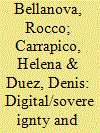

|
|
|
|
|
| Summary/Abstract |
The notion of digital sovereignty, also often referred to as technological sovereignty, has been gaining momentum in the European Union’s (EU) political and policy discourses over recent years. Digital sovereignty has come to supplement an already substantial engagement of the EU with the digital across various security policy domains. The goal of this article and of the overall Special Issue is to explore how the discourse and practices of digital sovereignty redefine European security integration. Our core argument is that digital sovereignty has both direct and indirect implications for European security as the EU attempts to develop and control digital infrastructures (sovereignty over the digital), as well as the use of digital tools for European security governance (sovereignty through the digital). It is thus essential to further explore digital sovereignty both in terms of European policies and of a re-articulation of sovereign power and digital technologies – what we suggest calling digital/sovereignty.
|
|
|
|
|
|
|
|
|
|
|
|
|
|
|
|
| 5 |
ID:
164283


|
|
|
|
|
| Summary/Abstract |
What does it mean to study security from a critical perspective? This question continues to haunt critical security studies. Conversations about normative stances, political engagement, and the role of critique are mainstays of the discipline. This article argues that these conversations tend to revolve around a too disembodied image of research, where the everyday practice of researchers is sidelined. But researchers do do research: they work materially, socially, and cognitively. They mediate between various feedback loops or fields of critique. In doing so, they actively build and exercise critique. Recognizing that fact, this article resists growing suggestions to abandon critique by, first, returning to the practice of critique through the notion of companionship. This permits us to reinvigorate our attention to the objects, persons, and phenomena through which critique gains inspiration and purpose, and that literally accompany our relationship to critique. Second, we explore what happens when our companions disagree, when critique faces controversies and (a) symmetries. Here, we support research designs of tracing credibility and establishing symmetries in order to move away from critique as denouncing positions we disagree with. Third, we discuss the relation between companionship, critique, reflexivity, and style. Here, the rhetorical practices of critical inquiry are laid out, and possibilities for its articulation in different and less silencing voices are proposed.
|
|
|
|
|
|
|
|
|
|
|
|
|
|
|
|
| 6 |
ID:
187082
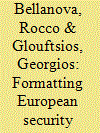

|
|
|
|
|
| Summary/Abstract |
In this article, we explore the security politics of EU database interoperability, inquiring how knowledge infrastructures underpin European security integration. Sitting at the intersection of Science and Technology Studies (STS) and critical approaches to European security, we unpack the co-constitutive relation between database anxieties and interoperability mechanisms. By database anxieties, we refer to what European institutions identify as the main epistemic and operational concerns that emerge from the current use of databases by security authorities across Europe. These anxieties are expected to be resolved by mechanisms that foster interoperability. We argue that the relation between database anxieties and interoperability mechanisms shapes the novel conditions of possibility for European security integration in a datafied world. While far-reaching in technological terms, interoperability is not about introducing a new overarching system, but about the management, re-organisation and re-purposing of datasets. Such formatting matters politically because it eventually informs sovereign acts of policing and mobility control.
|
|
|
|
|
|
|
|
|
|
|
|
|
|
|
|
| 7 |
ID:
124456


|
|
|
|
|
| Publication |
2013.
|
| Summary/Abstract |
In 2008, debates over the deployment of body scanners in EU airports gave rise to imbroglios of technologies, bodies, law, and policies. Eventually, these entanglements appeared to be undone and resolved by the concealment of bodies from the screens of the machines-which had, meanwhile, been renamed security scanners. Using the concept of setting, this article describes the processes of disappearance operating among a vivid multiplicity of actants and connections and identifies three main paradoxical features characterizing them. Based on this analysis, the article advances the notion of the politics of disappearance, where heterogeneous elements-both material and immaterial, visible as well as invisible-actively contribute to the making of a security practice and, potentially, to the opening of political landscapes.
|
|
|
|
|
|
|
|
|
|
|
|
|
|
|
|
|
|
|
|
|